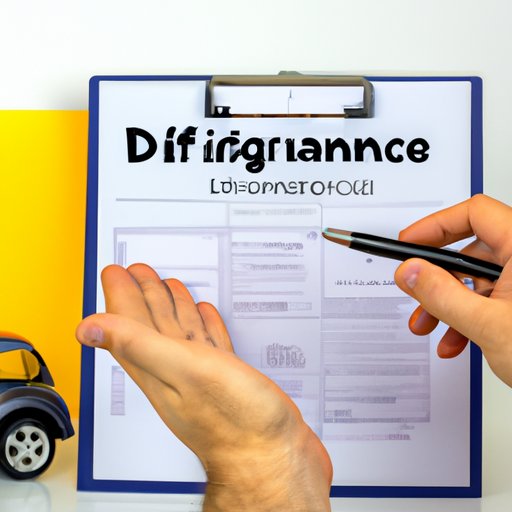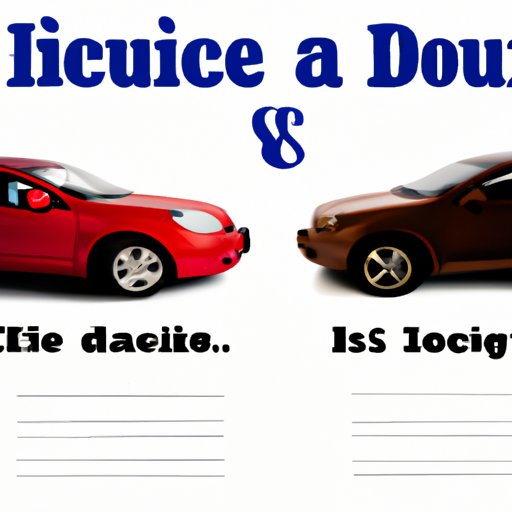Introduction
When it comes to car insurance, understanding deductibles is an important part of making sure you’re getting the right coverage for your needs. But what exactly is a deductible and how does it work? This guide will explain everything you need to know about deductibles for car insurance, including how deductibles affect your premiums, types of deductibles, and tips for choosing the right deductible for your policy.

Explaining Deductibles for Car Insurance: What You Need to Know
A deductible is the amount of money that you agree to pay out-of-pocket when you make a claim on your car insurance policy. The deductible is the portion of the claim that you are responsible for before your insurance company pays the remaining balance. For example, if you have a $500 deductible and a claim of $1,000, you would be responsible for paying the first $500 and your insurance company would cover the remaining $500.
When you purchase a car insurance policy, you will typically be asked to select a deductible amount. This amount can range anywhere from $0 to $2,000 or more, depending on the type of coverage you are purchasing and the insurer you are working with. Your deductible selection will affect the cost of your premiums and the amount of coverage you receive. It’s important to understand how deductibles work for car insurance in order to make an informed decision about the type of coverage that best meets your needs.
A Guide to Understanding How Deductibles Work for Car Insurance
Deductibles play a big role in determining the cost of your car insurance premiums. Generally speaking, the higher the deductible, the lower your premiums will be. If you choose a higher deductible, you should be prepared to pay more out-of-pocket if you ever need to file a claim. On the other hand, if you choose a lower deductible, your premiums will be higher, but you will have less financial responsibility when it comes time to file a claim.
Most insurance companies have a limit on the amount of deductible they will allow. This maximum deductible will vary by state and insurer, so it’s important to check with your provider to determine the limits that apply to you. Additionally, some insurers may impose additional restrictions on the type of deductible you can select.
The amount of deductible you choose can also be affected by other factors, such as your driving record, the type of vehicle you drive, and the coverage you select. For instance, if you have a poor driving record, you may be required to choose a higher deductible in order to receive coverage. Similarly, if you drive an expensive car, you may be required to choose a higher deductible in order to keep your premiums low.

The Basics of Deductible Coverage for Auto Insurance
In general, there are two types of deductibles you can choose from when selecting your car insurance coverage: compulsory and voluntary. Compulsory deductibles are required by law and depend on the type of coverage you have purchased. Voluntary deductibles are optional, and you can choose any amount you wish, up to the limit set by your insurer.
In addition to these two types of deductibles, there are two main types of coverage that may require a deductible: comprehensive and collision. Comprehensive coverage protects you from damage caused by events other than a collision, such as theft, fire, hail, and vandalism. Collision coverage covers damage caused by a collision with another vehicle or object.

The Pros and Cons of High and Low Deductibles on Car Insurance
When deciding on the deductible for your car insurance policy, it’s important to consider the pros and cons of each option. Choosing a higher deductible can help you save on your premiums, but it also means you will be responsible for more of the cost of a claim. Conversely, choosing a lower deductible can mean higher premiums, but you will be responsible for less of the cost of a claim.
Pros of High Deductibles: Lower premiums; more control over your finances.
Cons of High Deductibles: Higher out-of-pocket costs if you need to file a claim; higher risk of being underinsured.
Pros of Low Deductibles: Lower out-of-pocket costs if you need to file a claim; more protection in the event of a major accident.
Cons of Low Deductibles: Higher premiums; less control over your finances.
When Should You Opt for a Higher Deductible on Your Car Insurance?
Choosing a higher deductible can be beneficial in certain situations. If you are a safe driver with a good record and you don’t anticipate having to file a lot of claims, then a higher deductible might be a good option for you. Additionally, if you have a tight budget and need to keep your premiums low, then opting for a higher deductible can be helpful.
On the other hand, if you are an inexperienced driver or you anticipate needing to file a lot of claims, then a lower deductible might be a better choice. Additionally, if you want more protection in the event of a major accident, then a lower deductible can provide peace of mind.
How Deductibles Affect the Cost of Car Insurance
Your deductible selection can have a significant impact on the cost of your car insurance premiums. As previously mentioned, the higher the deductible, the lower the premiums. However, it’s important to remember that this relationship works both ways. If you choose a lower deductible, your premiums will be higher, but you will have less financial responsibility if you ever need to file a claim.
The deductible also affects the amount of money you will receive if you ever need to file a claim. If you have a high deductible, you will be responsible for more of the cost of a claim, but you will receive more money from your insurer if the claim is approved. Conversely, if you have a low deductible, you will be responsible for less of the cost of a claim, but you will receive less money from your insurer in the event of a claim.
Tips for Choosing the Right Deductible for Your Car Insurance Policy
Choosing the right deductible for your car insurance policy can be tricky. Here are some tips to help you make the best decision for your needs:
- Consider your financial situation. Think about how much you can afford to pay out-of-pocket if you ever need to file a claim.
- Review your coverage needs. Do you need comprehensive or collision coverage? Are you looking for basic liability coverage?
- Understand your risk tolerance. Are you willing to take on more financial responsibility in exchange for lower premiums?
- Shop around for quotes. Different insurers offer different deductibles, so it pays to compare.
Conclusion
Understanding how deductibles work for car insurance is an important part of making sure you get the right coverage for your needs. Deductibles can have a significant impact on the cost of your premiums, as well as the amount of money you would receive if you ever need to file a claim. When deciding on a deductible, it’s important to consider your financial situation, review your coverage needs, understand your risk tolerance, and shop around for quotes. By taking the time to research your options, you can ensure that you get the best coverage for your needs at the most affordable price.
(Note: Is this article not meeting your expectations? Do you have knowledge or insights to share? Unlock new opportunities and expand your reach by joining our authors team. Click Registration to join us and share your expertise with our readers.)
